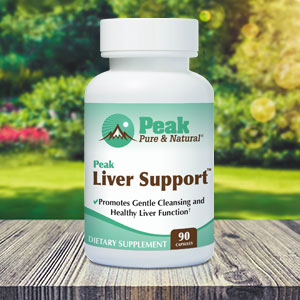Get Easy Health Digest™ in your inbox and don’t miss a thing when you subscribe today. Plus, get the free bonus report, Mother Nature’s Tips, Tricks and Remedies for Cholesterol, Blood Pressure & Blood Sugar as my way of saying welcome to the community!
‘Banned’ chemical in everyday products fast-tracks fatty liver disease

Excess fat anywhere on your body is bad for you, but when that fat is one particular organ — your liver, the consequences can be devastating. In fact, for the estimated 100 million Americans living with fatty liver disease, the road to liver scarring and even cancer can be far too short.
Now, a new study has found that one specific chemical could be lurking in products you use every day.
It’s one that could be secretly packing that fat into your liver, making you sick and increasing your risk of death, without you even knowing it.
A banned antibacterial
The chemical known as triclosan is one you’ve probably heard of since it was only a few short years ago that the FDA banned its use in antibacterial soaps and body washes.
That ban was based on study findings that showed triclosan had the potential to:
- Disrupt hormonal balance
- Accelerate the development of antibiotic-resistant germs
- Harm the immune system
- Promote the formation of liver tumors
And since the FDA determined that using antibacterial soaps powered with triclosan was no more effective than plain soap and water, they told manufacturers that their triclosan field day was over…
But only when it came to products you wash with.
Despite all of the evidence that triclosan could be dangerous to your health, the FDA hasn’t yet forced companies to remove the chemical from other types of household products.
Some that could still be jam-packed with it include:
- Cosmetics
- Toothpaste and Mouthwashes
- Deodorant
- Athletic clothing
- Food packaging
And according to the Mayo Clinic, “When you use a product containing triclosan, you can absorb a small amount through your skin or mouth.”
One more triclosan danger exposed
And now, researchers from the University of California San Diego School of Medicine have just discovered more evidence that triclosan is a huge risk to your health, finding that when combined with a high-fat diet, it’s the perfect recipe for fatty liver development.
For the study, the researchers fed a high-fat diet to mice with type 1 diabetes. And on cue, the mice developed non-alcoholic fatty liver disease (NAFLD).
Then the team fed some of the mice triclosan at a level that would be comparable to normal human exposure from those household products we talked about.
And you probably guessed it…
Compared to mice only fed a high-fat diet, triclosan accelerated the development of fatty liver and fibrosis or liver scarring.
The scientists were able to determine that the reason triclosan is so dangerous to the liver is that it disrupts metabolism as well as your gut microbiome, while also stripping away your liver cells’ natural protections.
This means that if you’re already eating a high-fat diet, which is a risk factor for fatty liver, and you add triclosan exposure to the mix, things can go from bad to worse — fast.
This also means that if you haven’t been a label reader in the past, now is definitely the time to start in order to guard your liver against the ravages caused by excess fat in the organ.
So be on the lookout to keep triclosan from damaging your liver. You can check out a partial list of triclosan-containing products to avoid here.
Editor’s note: Have you heard of EDTA chelation therapy? It was developed originally to remove lead and other contaminants, including heavy metals, from the body. Its uses now run the gamut from varicose veins to circulation. Click here to discover Chelation: Natural Miracle for Protecting Your Heart and Enhancing Your Health!
Sources:
Antimicrobial soap additive worsens fatty liver disease in mice — EurekAlert!
Should I avoid products that contain triclosan? — Mayo Clinic














